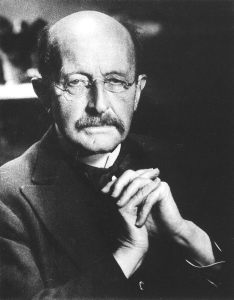April 23: Max Planck
Max Planck (1858)
It was on this date, April 23, 1858, that German physicist Max Planck was born Max Karl Ernst Ludwig Planck in Kiel, Schleswig-Holstein. Although the son of a law professor, and a gifted musician, Planck turned to physics and thermodynamics, invented quantum theory, and developed a formula to predict how the radiation an object emits is related to its temperature, known today as Planck’s Constant and symbolized by the letter h. He lectured at Columbia University in 1909, and was made rector of the University of Berlin in 1913. Max Planck received the Nobel Prize for Physics in 1918. The Royal Society of Great Britain gave him the Copley Medal in 1928. Among Planck’s books were Principles of Conservation of Energy (1887), Lectures on Thermo-Dynamics (1897), Lectures on the Theory of Heat Radiation (1906), Introduction to the Theory of Physics (1930) and Where Is Science Going? (1932). Though opposed to the Nazi Party during the ascendancy of the Third Reich in Germany, Planck refused to leave the country and suffered hardship as a result, including the execution of one of his three sons in 1945 for joining the July 20 Plot to assassinate Hitler.
Religion was a tradition and a duty in Planck’s family, but Planck himself was more tolerant of other religions, especially Judaism, than most of his countrymen—even defending German-Jewish chemist and 1918 Nobel Laureate Fritz Haber in spite of the Nazi government. Planck believed every scientist must be a man of imagination and faith, but by “faith” he meant “having a working hypothesis.” Therefore, Planck would say, in Where Is Science Going?, “Anybody who has been seriously engaged in scientific work of any kind realizes that over the entrance to the gates of the temple of science are written the words: Ye must have faith. It is a quality which the scientist cannot dispense with.” Elsewhere in the same work, he wrote, “Religion belongs to that realm that is inviolable before the law of causation and therefore is closed to science.” And was almost pantheist in his view of God as an “ideal Sprit”—one could hardly call him Christian—one biographer observing that Planck was “far removed from all dogmatic, mystery-mongering beings.” Indeed, six months before his death, Planck was questioned about a rumor that he had converted to Roman Catholicism, but the celebrated scientist declared that although his religion ran deep, he did not believe “in a personal God, let alone a Christian God.”
But as if to demonstrate that a scientist, no matter how accomplished, does not necessarily have the tools with which to “speak out of school,” especially on religion, in a 1944 speech Planck stated his rationale for belief in God thus: “As a man who has devoted his whole life to the most clear headed science, to the study of matter, I can tell you as a result of my research about atoms this much: There is no matter as such. All matter originates and exists only by virtue of a force which brings the particle of an atom to vibration and holds this most minute solar system of the atom together. We must assume behind this force the existence of a conscious and intelligent mind. This mind is the matrix of all matter.”*
Planck died on 4 October 1947, aged 89, in Göttingen, Lower Saxony, Germany. It was Max Planck who famously said, “A new scientific truth does not triumph by convincing its opponents and making them see the light, but rather because its opponents eventually die, and a new generation grows up that is familiar with it.”**
* Das Wesen der Materie [The Nature of Matter], speech at Florence, Italy (1944) (from Archiv zur Geschichte der Max-Planck-Gesellschaft, Abt. Va, Rep. 11 Planck, Nr. 1797) ** Wissenschaftliche Selbstbiographie. Mit einem Bildnis und der von Max von Laue gehaltenen Traueransprache. Johann Ambrosius Barth Verlag (Leipzig 1948), p. 22, as translated in Scientific Autobiography and Other Papers, trans. F. Gaynor (New York, 1949), pp. 33–34 (as cited in T. S. Kuhn, The Structure of Scientific Revolutions).
Originally published April 2003 by Ronald Bruce Meyer.


